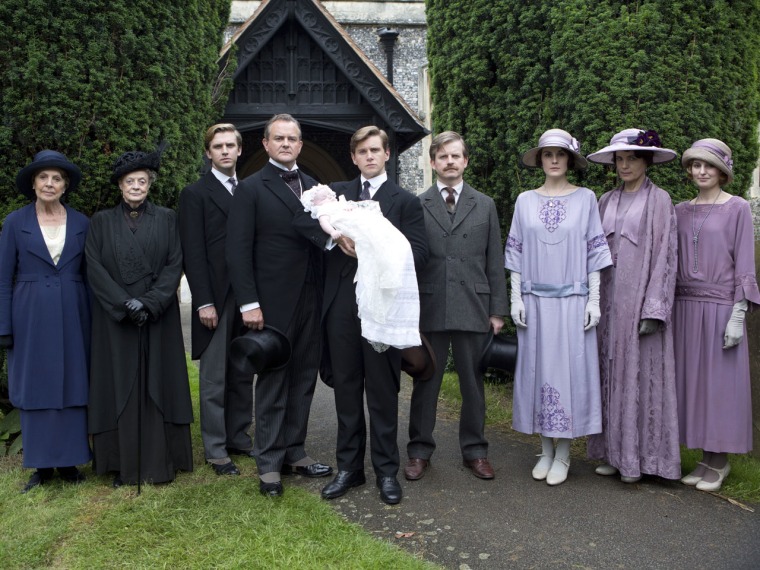The characters, the costumes and the sumptuous trappings of post-Edwardian England have millions of viewers hooked on Downton Abbey. But equally addictive, it seems, is the British drama’s theme song by British composer John Lunn.
“Hearing that theme song makes me react like the ‘Desperado’ guy Elaine dated on Seinfeld,” says Gina Lindblad, a 34-year-old public relations rep from Seattle. “I just stop what I'm doing, take it all in and accept the fact that I'm going to be there a while. Watching 'Downton Abbey' is like drinking a really good pinot noir, eating amazing chocolate and getting a massage all at the same time.”
Rolling Stone calls the melody a “rapturous theme song that makes fans of Edwardian romance drool like Pavlov's dogs.” And according to Shara Sand, a New York psychologist with a masters in music, the comparison’s not far off.
“What’s grabbing is there’s this constant pulsing rhythm,” she says. “The rhythm is really what’s driving the melody and people respond to that. There’s a momentum.”
They also respond to the “minor tonality” of the piece, which she says helps create an anticipatory reaction.
“Musically, it sets the listener on edge,” she says. “They’re waiting for it to resolve. In 'Downton Abbey’s' theme, the rhythm is driving and the melody comes in and there’s a soaring sense. It wants to take off and course when things take off, they have to land. That’s what people are waiting for – the resolution of the theme. The music gets you excited.”
So excited, she says, that we actually do respond like Pavlov’s dogs, psychologically drooling at the thought of more unexpected plot twists or witty barbs from Maggie Smith’s Dowager Countess.
“It’s an associative marker,” she says. “The music gets you revved up. You hear it from the kitchen you’re like, ‘Oh, I’ve got to watch!’ The music gets associated with the enjoyment of the series and that’s the Pavlovian response. It’s signaling that there’s good stuff to come.”
Sand notes that part of our positive response also has to do with the fact the theme has a good beat – something that we respond to both physically and psychologically.
“As I was listening to it, I found my head bopping to the beat, my toe tapping,” she says. “Not all music does that. Our heart pumps blood, we have a pulse, we walk at a certain pace. There’s a rhythm and a pulse all around us. We’re not necessarily aware of it, but it consciously impacts us when we hear it. That’s why people like high energy music when they’re running or at the gym. Their body goes with it.”
As it turns out, viewers may have James Brown, the godfather of soul, to thank for the show’s driving beat.
In an interview with the UK’s Daily Record last September, "Downton's" music composer Lunn revealed his love of funk from the late 1960s, citing James Brown and Sly and the Family Stone as inspirations. Bartok, Stravinsky and Bach are also influences, he said.
Sand, an associate professor of psychology at LaGuardia Community College, says composers, particularly those who write music for TV and movies, are often able to tap into universal feelings.
“There are instruments you can use that will create certain sounds, certain tempos, certain keys,” she says. “Elements of the musical structure can be used to create a psychological framework.”
The theme song for "Game of Thrones," for instance, is “much more martial and militaristic” but she says it has a similarly strong underlying beat as 'Downton’s' theme.
“It’s a more tonal piece, it’s more aggressive in some ways, but it does a similar thing to people,” she says. “The beat creates an anticipatory quality. It makes you move forward. You’re wondering, ‘Where is this going to go?’”
Juan Alonso-Rodriguez, a 56-year-old visual artist from Seattle, says he has the same kind of anticipatory reaction whenever he hears the theme to "True Blood," an ongoing HBO vampires series set in Louisiana.
“It sets up this weird Cajun southern vibe and ‘allows’ you to want to be bad even if vicariously for an hour,” he says. “It takes me there to the heat, humidity, hunger and lust.”
A fan of "Downton Abbey," as well, he says he definitely relates to the Pavlovian response. But adds the music also makes him yearn for a quiet country picnic with friends.
“It makes me want to take a drive in the country, to relax,” he says. “And of course, wear white summery attire.”
Sadly, this Sunday marks the end of the third season of the popular British show, which may make some fans feel as depressed as middle sister Edith Crawley after being jilted at the altar.
“People may find themselves missing the song and the excitement and anticipation they associate with hearing it,” says Sand. “Sunday night will come around and maybe the theme will pop into your mind. You’ll hum it and then realize with disappointment you aren’t going to hear it. You’ll feel let down and perhaps an even greater desire to hear it.”
Not to worry, though. There’s always the soundtrack.
What TV theme song do you love most? Tell us on Facebook.
Related:
